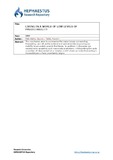| dc.contributor.author | Makridakis, Spyros | |
| dc.contributor.author | Taleb, Nassim | |
| dc.date.accessioned | 2015-12-08T08:08:37Z | |
| dc.date.available | 2015-12-08T08:08:37Z | |
| dc.date.issued | 2009 | |
| dc.identifier.issn | 0169-2070 | |
| dc.identifier.uri | http://hdl.handle.net/11728/6364 | |
| dc.description.abstract | This conclusion aims to summarize the major issues surrounding forecasting, as well as the extensive empirical evidence
proving our inability to accurately predict the future. In addition, it discusses our resistance to accepting such inaccurate
predictions, while putting forwards a number of ideas aimed at a complex world where accurate forecasting is impossible
and where uncertainty reigns. | en_UK |
| dc.language.iso | en | en_UK |
| dc.publisher | Elsevier | en_UK |
| dc.relation.ispartofseries | International Journal of Forecasting;25 | |
| dc.rights | 2009 International Institute of Forecasters. Published by Elsevier B.V. All rights reserved. | en_UK |
| dc.rights.uri | http://creativecommons.org/licenses/by-nc-nd/4.0/ | en_UK |
| dc.subject | Forecasting | en_UK |
| dc.subject | Accuracy | en_UK |
| dc.subject | Black Swans | en_UK |
| dc.subject | Low level predictability | en_UK |
| dc.subject | Illusion of control | en_UK |
| dc.subject | Paradox of control | en_UK |
| dc.title | Living in a world of low levels of predictability | en_UK |
| dc.type | Article | en_UK |
| dc.doi | 10.1016/j.ijforecast.2009.05.008 | |


